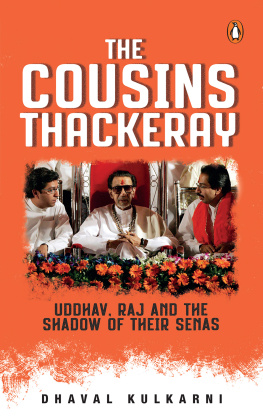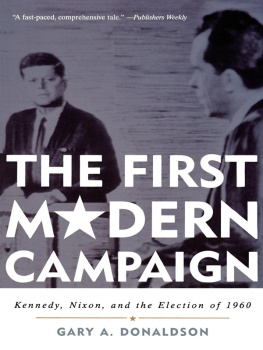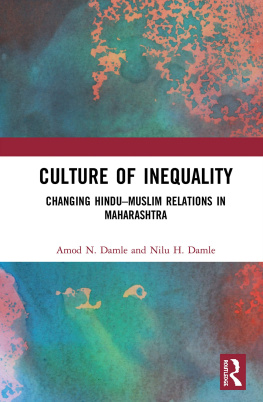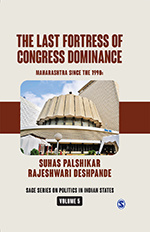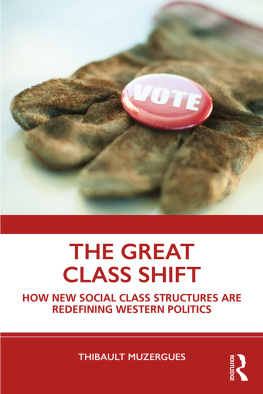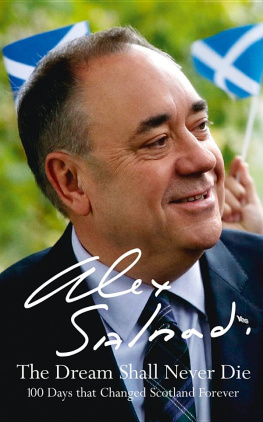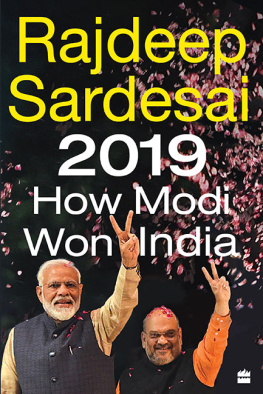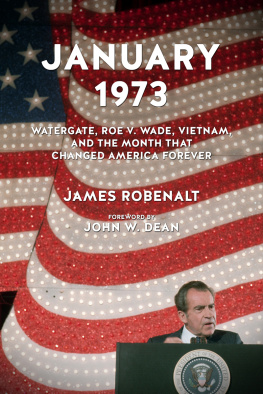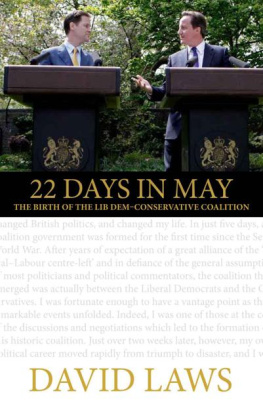Table of Contents
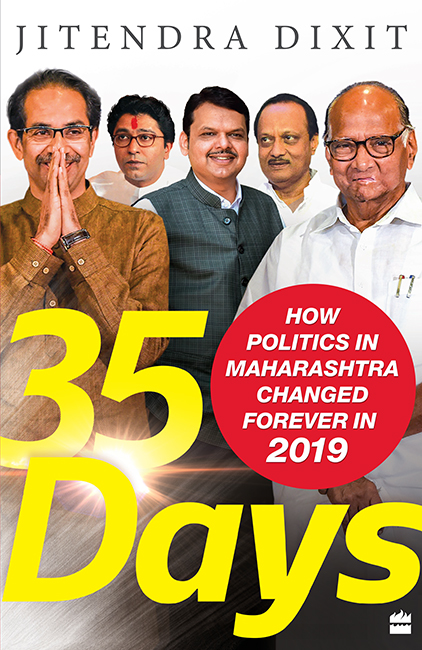

To my teachers:
Milindji
Milind Khandekar, Digital EditorIndia, BBC
Big Boss
Udayshanker, President, The Walt Disney Company, Asia Pacific, and Chairman, Star and Disney India
Crazy Old Man
Sudhakar Solomonraj, Head of the Department of Political Science, Wilson College, Mumbai
Contents
T he thirty-five days preceding the swearing-in of Uddhav Thackeray as chief minister (CM) of Maharashtra will be remembered in the states political history as a period of dramatic and surprising events. It was the most-watched Mumbai-based news event in India on television after the terrorist attacks on 26 November 2008.
What happened during these thirty-five days was unimaginable and baffled even hardcore political pundits. The period was marked by the unpredictable moves of political parties, friends becoming enemies, enemies becoming friends, ideologies becoming redundant and power taking precedence over blood relations. It unmasked almost all the parties and politicians of the state. The outcome of this drama led to radical changes in the politics of Maharashtrathe Shiv Sena subtly went soft on Hindutva and embraced secularism; the Congress joined hands with its three-decade-old nemesis; the Maharashtra Navnirman Sena (MNS) subtly changed its prime agenda from militant Marathi politics to Hindutva, and Sharad Pawar again became relevant.
During my twenty-year career as a television journalist, I have covered several state assembly and general elections, but I found the 2019 post-election scenario in Maharashtra the most interesting, complex and unpredictable. As part of my professional brief, I have been witness to this story and was personally present during the unfolding of major events. Most of the happenings were being reported live by me and my team of reporters. Many interesting aspects of this story deserved to be narrated in a book. Those thirty-five days defied common sense and questioned the established understanding of the Indian political system.
The five-week-long drama revealed how the urge to achieve power could lead to surprising decisions and unimaginable partnerships. This drama had its own heroes and villains. If you have read epics like the Ramayana and Mahabharata, you will find many characters in this story resembling Bhim, Arjun, Bheeshma, Duryodhan, Shakuni, Ram, Hanuman and so on. The story also shows that age can be just a number for a sharp political mind.
Writing this book took me back twenty-five years to a classroom in Mumbais Wilson College where, as a student of Political Science, I was introduced to the thoughts of Italian political philosopher, Niccolo Machiavelli. Machiavellian politics is regarded as unscrupulous and amoral. But while going through the pages of this book, you may realize how relevant his thoughts are even 500 years after his death.
The idea of democracy has been taking interesting turns in India. While writing the book, I felt that during those thirty-five days the sun of democracy was eclipsed by elements that made a mockery of it. Although all the political parties and politicians in India swear by the Constitution and project themselves as upholding democratic values, reality contradicts them. Those thirty-five days showed us that to achieve power, anything is acceptable even if it is unscrupulous. The happenings during those days question the general understanding of democracy, ethics, morality and law. I started my career as a crime reporter and after viewing this political drama, I can conclusively say that greed, conflict, lying, cheating, backstabbing and revenge are words which have become common to both politics and crime.
Realpolitik is selfish but projects itself to be benevolent. It is unemotional but uses public emotions as the basis to achieve goals. In this story, you will see some characters as heroes and some as villains, but they also interchange their roles. Some people have elements of both.
While covering this political drama I was reminded of two quotes on politics. Theodore Roosevelt said, The more you know about the past, the more you are prepared for the future. Irish statesman and philosopher Edmund Burke had similar thoughts, Those who dont know history are destined to repeat it. These words convinced me to write this book. What I was covering as a journalist was historic and needed to be documented for the future, to know what kind of games were being played for power.
The first draft of the book was purely based on my memory and notes taken during the coverage, but to double check the facts and get things down verbatim, I viewed hours of video footage and browsed through all the newspaper coverage of those thirty-five days. The book is not just a chronological narration of the events but also encompasses my own experiences, observations and analysis while covering the great political drama. Another objective of 35 Days is to give readers an idea of contemporary Maharashtra politics, therefore it briefly sketches some prominent political personalities of the state, their rise and fall. There is no intended malice against anyone.
While writing this book, I have relived those days. The coverage demanded several adjustments in my daily life. I got hardly four or five hours of sleep daily. Meal and exercise timings, and my overall routine, went haywire. Weekly off days were forfeited. I was able to interact with my seven-year-old son, Vedaanta, thirty-five days after the election results were declared. The circumstances were such that I would leave for coverage by 6 a.m. when he was still asleep. By the time I returned at midnight or thereabouts, he was back in bed, in the world of dreams. On 28 November, when I reached home at 9.30 p.m., he seemed happier than Aaditya Thackeray, whose father became the chief minister that evening. It was a memorable reunion.
M aharashtra has been politically important for India since the pre-Independence era. Leaders from this region have played a pivotal role during the freedom struggle. Lokmanya Tilak, Gopalkrishna Gokhale and Vinoba Bhave were some of the thought leaders from Maharashtra who gave shape to the freedom movement. Noted social reformers like Jyotirao Phule, Dr B.R. Ambedkar and Nanaji Deshmukh hailed from the state.
After Independence, too, the state has produced numerous leaders who have influenced national politics. Yashwantrao Chavan, Shankarrao Chavan, Sharad Pawar and Pramod Mahajan have been some of the key players of national politics. The state has also given the nation a few presidents and Lok Sabha speakers.
The road to Delhi goes through Maharashtra. The state has 48 Lok Sabha seats, the second highest after Uttar Pradesh. So a party, or a coalition of parties, which aspires to capture power at the Centre, has to strive to get the maximum number of seats from this west Indian state.
The Bharatiya Janata Party (BJP) won a thumping number of seats in the 2019 Lok Sabha elections. The BJPShiv Sena combine won 41 seats, while the opposing CongressNationalist Congress Party (NCP) alliance got fewer seats than expected, with 1 seat going to Asaduddin Owaisis party, All India Majlis-e-Ittehadul Muslimeen (AIMIM), and 1 to an independent candidate. A fidayeen terrorist attack in Pulwama on 14 February 2019, prior to the Lok Sabha elections, had resulted in air strikes to avenge the attack; the BJPShiv Sena combine was seen to capitalize on the sentiments post the attack and the air strikes. Issues that were projected as a cause of worry for the Modi government prior to the attacksuch as demonetization and the hasty implementation of the Goods and Services Tax (GST)didnt cause any negative impact on voting during the Lok Sabha elections.


